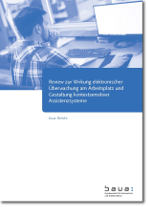- Project number: F 2419
- Institution: Federal Institute for Occupational Safety and Health (BAuA)
- Status: Completed Project
Description:
Smart devices such as tablets and smart glasses are being deployed ever more frequently in the world of work - for instance in “context-sensitive work assistance systems”, which display helpful information tailored to the particular situation for employees in the workplace.
The aim of this project was to integrate the provision of information via a work assistance system with ergonomic recommendations organisation and personnel development measures. A work assistance system was designed that delivers relevant information in contemporary production environments and is capable of adapting its output in response to changing working conditions. This system was to be complemented with targeted, personalised regenerative and compensatory training (e.g. courses on how to vary and balance out workloads). In order to do this, the assistance system can be used to record and analyse relevant sequences of movements and workflows. The Federal Institute for Occupational Safety and Health (Bundesanstalt für Arbeitsschutz und Arbeitsmedizin, BAuA) investigated how people were affected by the specific, context-dependent provision of relevant information (e.g. process and production data) using this body-worn mobile smart devices.
In this context, an experimental laboratory study was developed that was based on the requirements that have to be met in increasingly digitalised industrial settings. The participants were asked to carry out an assembly task of the kind common in the automotive industry using a context-sensitive work assistance system. Objective performance parameters were analysed, such as the time needed to execute the task. At the same time, aspects of the system’s usability, the technology’s acceptance, and workload and stress measurement methods were looked at in the light of the forms in which the information was supplied and the assistance technologies that were applied. The results suggest the utilization of a mobile assistance system to supply context-sensitive information can help to optimise the mental workload at complex workstations. In addition, feedback from the study participants indicated the mobile assistance system was more usable than a stationary system.
A systematic literature review was conducted to evaluate the impacts monitoring with context-sensitive assistance systems could potentially have on people in the workplace. The results of the various research activities were drawn on to draft design guidelines that would ensure employees stayed safe and healthy. The project’s outcomes were disseminated in scientific publications and talks at national and international events.
The research and development project “Work assistance system for the individualisation of work and training methods (AIM)” was financed by the Federal Ministry of Education and Research (Bundesministerium für Bildung und Forschung, BMBF) and administered by Project Management Agency Karlsruhe (PTKA) (Funding Code FKZ 02L14A162).
